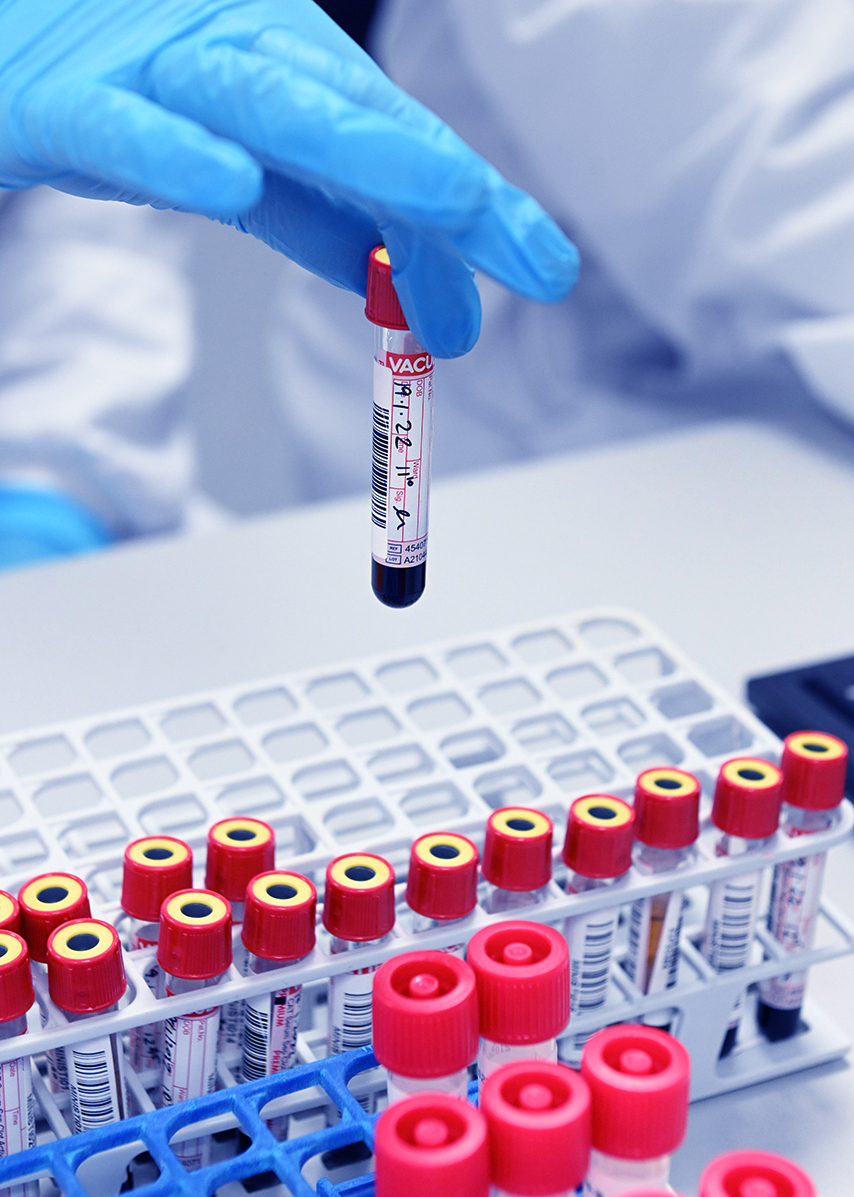AST is also present in cardiac muscle, skeletal muscle, renal, brain tissue, pancreas, lung tissue, leukocytes and erthyrocytes. Because it is also found in other systems, it can rise after acute myocardial infarction, acute pancreatitis, acute haemolytic anaemia, severe burns, acute renal disease, musculoskeletal diseases and trauma.
Aspartate Transferase (AST)

Aspartate Transferase (AST)
Aspartate Transferase (AST) is an enzyme most commonly associated with liver parenchymal cells. An abnormal level of AST most commonly indicates underlying liver diseases such as hepatitis, non-alcoholic steatohepatitis (NASH) or alcohol-related liver disease. Aspartate Transferase (AST) is usually one of a group of tests used to investigate the health of the liver.
Increased levels of AST commonly occur with hepatitis, NASH and liver cancer. The highest serum levels occur in viral and toxic hepatitis and ischaemic necrosis. Non hepatic causes include muscular disorders such as polymyositis, acute muscle injury, acute pancreatitis, acute renal failure, acute myocardial infarction and hypothyroidism. AST increase in the absence of ALT indicated cardiac or muscle disease. Minor increases are often transient and benign, and may be related to intercurrent illness, medication use or strenuous exercise.
Analysing the relationship between AST and ALT (AST: ALT ratio) is often useful; it can be suggestive of certain conditions as there is a considerable overlap. However it is not exclusive and only serves as an aid to clinical decision making. An AST:ALT ratio of > 2:1 is characteristic in patients with alcoholic liver disease. In contrast, viral hepatitis causes ALT to rise more than AST, and the ratio is usually <1, particularly true of hepatitis C. In Wilson’s disease can cause the AST/ALT ratio to exceed 4.
Transaminases are rarely >10 times the upper limit of normal in uncomplicated alcoholic hepatitis.
Transaminases >20 times can indicate acute viral infection, ischaemic hepatitis, drug or paracetamol toxicity.
Raised AST levels can also occur because of medication, most commonly paracetamol, NSAIDs, ACE-inhibitors, TB treatment (isoniazid), erythromycin and fluconazole.
Please contact us for more information on the reference ranges used at Enfer Medical.
Case Study
Delivering True Innovation
Our Services




5mL venous serum or plasma
Enfer Medical
Tests/Assays
Enfer Medical offers Tris buffer without P5P technology for the quantitative assay for Aspartate Transferase (AST). This test is CE-IVD certified.


Patient
Request Form
For clients using the Enfer Medical Client Portal, the Enfer Medical Patient Request Form (PRF) will be generated when you have completed your “Test Request” within the portal linked below.
Please note that samples suspected of containing high risk pathogens such as Mycobacterium tuberculosis should be clearly identified on the form and packed separately from other samples.



Results are available next working day.
This assay is available seven days a week.
Packaging
The packaging/preparation of samples for delivery to the laboratory are required to be in adherence to all national regulations for the safe transport of biological materials. HSE guidance can be reviewed HERE.
There are specific packaging instructions and labelling requirements requiring triple packaging including:
- Primary leak-proof container – tube or vial containing the sample.
- Secondary watertight container, with absorbent material, intended to protect the primary container.
- Outer container protects the secondary container.
- Patient Request forms must be placed between the secondary container and the outer shipping container.
Further information on the packaging/preparation of samples for delivery to the laboratory is contained within the Enfer Medical Laboratory User Manual which clients are provided with.


Storage & Stability
Specimens must be tested within 4 days of collection and stored at 2-8°C.


Samples
In addition to the packaging of samples, the transport/delivery of clinical samples to the laboratory is required to be in adherence to all national regulations for the safe transport of biological materials. Enfer Medical provides a fully compliant logistics service, aligned with clients’ testing requirements.
Prompt transport of specimens:
To ensure prompt testing of samples and release of results within the published test turnaround times, samples should arrive to the laboratory by 18:00. Test turnaround time is measured from receipt of the sample at the laboratory until the time the authorised results are reported to users.
of Samples
In rare cases specimens may not be suitable for testing on arrival to the laboratory. In that case the sample will be rejected at the receipt stage and the service user will be notified immediately and an explanation as to why the sample could not be processed will be provided. Reasons why samples cannot be processed include but are not limited to:
- Samples received beyond the stability limits and/or not at the correct temperature indicated for each test.
- Incorrect sample type received.
- Leaking samples, sample not received or sample insufficient for analysis as stated below within sample requirements.
- Non-compliant samples or request forms i.e. those missing sample date information, missing sample test request and/or missing sample site/type information.
- Samples received without the necessary patient identifiers.
Our Services




Quantitative results for Aspartate Transferase (AST) are reported in numeric value in U/L. Please contact us for more information on the reference ranges used at Enfer Medical.
Critical results are communicated in accordance with the Communication of critical results for patients in the community- national laboratory handbook CSP041/2019
Accessing
Your Results
Following receipt at the Laboratory, results should be available on the next working day and will be reported to the referring clinician via the Enfer Medical Client Portal or in a format agreed with clients.
Established clients can login to the portal using the link above.




